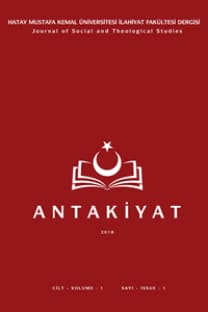İstanbul ve Herat: Sultanahmet Camii ve Herat Ulu Camii'nin Bir Karşılaştırmalı Değerlendirmesi
Camiler, İstanbul, Herat, Sultan Ahmet Camii, Herat Ulu Camii.
Istanbul & Herat: A Comparison Study of Blue Mosque & the Great Mosque of Herat
Mosques, Istanbul, Herat, Sultan Ahmet Mosque, the Great Mosque of Herat.,
___
Abdel-Hady, Zakaryya Mohamed. The Masjid, Yesterday and Today. Doha, Qatar: CIRS, Center for International and Regional Studies, Georgetown University School of Foreign Service in Qatar, 2010.Amanat, Abbas. “Herat Question; How Herat Was Separated from Iran.” The Homepage of the Circle of Ancient Iranian Studies (CAIS)©. Accessed September 24, 2021. https://cais- soas.com/CAIS/History/herat_question.htm.
Bakri Muhammad, Omar. “The Role of the Mosque.” Al-Muhajiroun Publications , 1996. https://www.scribd.com/document/49536119/The-Role-of-The-Mosque-Omar-Bakri-Muhammad.
Can, Aynur. “İsti̇klal Caddesi̇ And Kärtner Strasse.” Scribd. Marmara Üniversitesi, Mahalli İdareler ve Yerinden Yönetim. Accessed September 25, 2021. https://www.scribd.com/document/370841909/i- sti-klal-Caddesi-and-Kartner-Strasse.
Dalal, Radha. “The Blue Mosque (Sultan Ahmet Camii) (Article).” Khan Academy. Khan Academy. Accessed September 25, 2021. https://www.khanacademy.org/humanities/art-islam/islamic-art- late-period/a/the-blue-mosque-sultan-ahmet-camii.
Golombek, Lisa. “The Resilience of the Friday Mosque: The Case of Herat.” Muqarnas 1 (1983): 95. https://doi.org/10.2307/1523073.
“Herat-the Islamic City : A Study in Urban Conservation / Abdul Wasay Najimi.” Herat-the Islamic city : a study in urban conservation / Abdul Wasay Najimi. Accessed September 25, 2021. https://franklin.library.upenn.edu/catalog/FRANKLIN_995849843503681.
“History of Herat City.” The Islamic Republic of Afghanistan, Herat Province Governor Office. . Accessed March 25, 2021. http://herat.gov.af/fa/page/5843
ibn Al-Haj, Irshdul Haq Bashar, and Dr Abdullah. “History of A Mosque Of Herat And Its Roles In Afghanistan (Mas Jid-J Jami Heart).” Accessed September 25, 2021. http://ddms.usim.edu.my/handle/123456789/7458.
“Istanbul.” The Republic of Turkey, Ministry of Culture and Tourism. . Accessed February 25, 2021. http://kultur.gov.tr/genel/medya/iltanitimbrosuru-eng/iznik_eng.pdf.
Keyder, Çağlar. “A Brief History of Modern Istanbul.” The Cambridge History of Turkey, 2008, 504–23. https://doi.org/10.1017/chol9780521620963.019.
Mosques around the World: A Pictorial Representation: 1994 Bait-Ur-Rahman Mosque Souvenir. Silver Springs, MD: The Association, 1994.
Othman, R., and Z.J. Zainal-Abidin. “The Importance of Islamic Art in Mosque Interior.” Procedia Engineering. Published by Elsevier, December 19, 2011. https://www.sciencedirect.com/science/article/pii/S1877705811029535.
“Provincial Profile: Herat.” The Islamic Republic of Afghanistan, Office of the President. Accessed March 25, 2021. https://president.gov.af/en/herat/.
“The-Blue-Mosque-History-Architecture.” Study.com. Accessed September 25, 2021. https://study.com/academy/lesson/the-blue-mosque-history-architecture.html.
Weisbin, K. “Introduction to Mosque Architecture.” Khan Academy. Khan Academy. Accessed September 25, 2021. https://www.khanacademy.org/humanities/art-islam/beginners-guide-islamic- world-art/beginners-guide-islamic-art/a/arts-of-the-islamic-world.
“‘Herat.” In the Columbia Encyclopedia. Accessed September 25, 2021. http://www.encyclopedia.com
- Yayın Aralığı: Yılda 2 Sayı
- Başlangıç: 2018
- Yayıncı: Mustafa Kemal Üniversitesi
Dinsel ve Sanatsal Bir Değer Olarak Azize Agatha
Sanat ve Din İlişkisi: Türk-İslam Sanatları
Hadislerde Rü’yetullah Meselesi
Kimim Ben? Göçmen, Sığınmacı, Mülteci, Yabancı, Vatansız ve Geçici Koruma: Türkiye’deki Suriyeliler
İstanbul ve Herat: Sultanahmet Camii ve Herat Ulu Camii'nin Bir Karşılaştırmalı Değerlendirmesi
Şehir Şiirleri Bağlamında Arap Edebiyatında Antakya
İstanbul ve Herat: Sultanahmet Camii ve Herat Ulu Camii'nin Bir Karşılaştırmalı Değerlendirmesi
